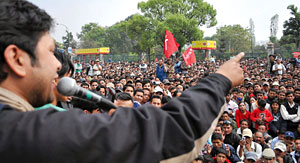 laxmi prasad ngakhushi/kantipur |
The Maoists were voted in even though they still have nearly 20,000 guerrillas in UN-monitored camps. For a group that suddenly went from war to power it may be difficult to swallow the decision, but being a constitutionally elected government it can't ignore the court either.
Justice Kalyan Shrestha in his ruling said the 2006 decision by the apex court to similarly reject the non-renewal of the tenure of Gen Pradip Pratap Bam Malla had created a precedent. He also said the government's decision to overturn the army's request without giving a reason went against the principles of the 'terms' and 'balance' of military service.
The bone of contention is who should have the right to renew the tenure of retiring officers. The court decision will now make it difficult for the Maoists, who still regard the army as an 'enemy' force, to take uniliateral decisions and will set a long-term precedent. The Maoist administration, which has been interfering in the army, police and civil service without any debate will now have to be much more careful about adhering to the rule of law.
The court will perhaps explain in more detail what it means by 'terms' and 'balance', but we can speculate that the justices are worried about unacceptable interference in the army's internal rules and traditions that have a bearing on morale and discipline. It also shows that the Defence Ministry can't do what it likes with the national army because in the present state of the country it would mean an unacceptable politicisation of the military. A civilian chain of command is desirable when things are stable. This fragile transition is the wrong time to tamper with the one institution that has so far been saved from politicisation. It would be extremely dangerous for a general at the Nepal Army HQ to have to go to the Maoist HQ in Buddhanagar to lobby for a promotion.
The other positive aspect of the Supreme Court order is that it has rejected the irrational politics of revenge. It was clear that the defence minister was itching to get back at the army for having stalled his attempt to stop the recruitment into the national army, which itself was stopped by an earlier court order. It was clear that the blocking of the tenure extension of the generals was not a decision of the defence minister as a member of the coalition government but was taken by the Maoist party at a conclave of its own army.
If the Maoists are smart, they will not let this controversy drag on and use the opportunity afforded by the Supreme Court decision to activate the Army Integration Special Committee on which it has been dragging its feet. UNMIN, which has a midterm report due at the UN Security Council, is losing patience with the lack of progress on integration, and the special committee which meets only to decide to meet again. It is almost certain UNMIN's tenure won't be extended beyond June and it also sure that integration can't be completed before then.
So the sooner the Maoist-led government and the army start working together on integration and not waste time on tit-for-tat, the better it will be for the peace process.



